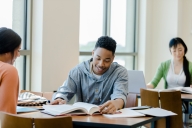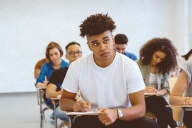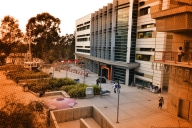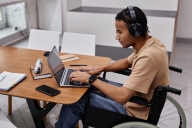You have /5 articles left.
Sign up for a free account or log in.
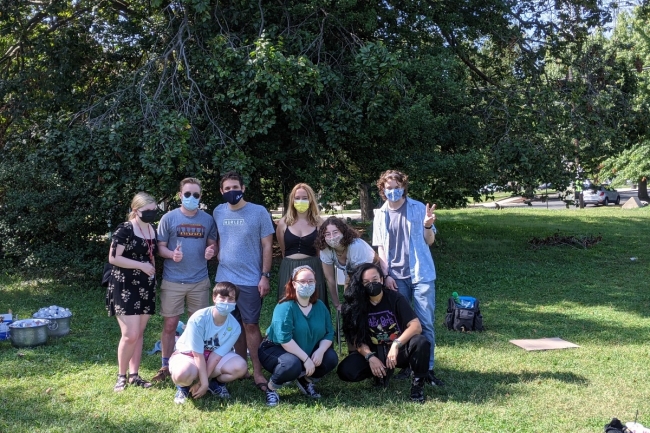
American University’s Disabled Student Union became an official university-recognized club last month.
Courtesy of Katherine Greenstein
When the pandemic was declared in spring 2020, Katherine Greenstein, then a high school senior, grew alarmed by the attitude of some classmates who said COVID-19 wouldn’t affect them—only “the elderly and the sick.” As someone with a chronic illness, Greenstein found such remarks insensitive and cavalier.
Those feelings persisted after Greenstein enrolled at American University in fall 2020. There wasn’t a venue on campus where students could talk about being disabled, Greenstein said, which seemed especially important during the pandemic, when so many students struggled with remote learning.
Online learning had its advantages, including that Greenstein could listen to lectures while waiting for doctors’ appointments. But Greenstein, who uses the pronoun they, often struggled with the poor sound quality and internet lags of online classes. So last February they began advocating for captioning services—which are beneficial for all students, especially those that are deaf or hard of hearing, Greenstein said—and the university recommended that Greenstein meet with other students to discuss the issue.
Those conversations led Greenstein and others to form American University’s Disabled Student Union. What started as an unofficial group in March became an official university-recognized club last month and has around 100 members, said Greenstein, now a second year student.
“I wanted a space for our community to feel safe,” Greenstein said. “I wanted a space for our community to complain.”
American University isn’t the only campus with a disabled students’ union. Similar groups have formed at institutions including Johns Hopkins University in Maryland, Purdue University in Indiana and St. Edward’s University in Texas. Though their approaches may vary, the organizations’ overarching goals are to improve campus accessibility for students with disabilities, raise awareness of the wide range of challenges they face and create a sense of community so students with disabilities don’t feel so alone.
Quinn O’Connor, a senior and co-founder of the University of California, Los Angeles, Disabled Student Union, said in the past few years she’s seen broader social movements include disability advocacy, a trend that COVID-19 hastened.
“The emergence of disabled student unions is honestly due to COVID and the activism it inspires, especially in students with disability, as well as just a broader opening towards being comfortable in your identity as a disabled person,” O’Connor said.
One big reason O’Connor said she decided to start a disabled student union on campus was that she had a hard time meeting other disabled students.
“The fact that it took me a year and a half to find one disabled student was the main reason why we wanted to build a community and make sure that there was a space for students to feel welcomed and feel like there were people that went through similar experiences as them,” O’Connor said.
The UCLA Disabled Student Union became an officially recognized club in March 2020 and now has more than 100 members, O’Connor said. It is currently fighting for UCLA to rehire an Americans with Disabilities Act compliance officer, which the university has posted on its job board. The group is also pushing for funding for the accommodations office to provide more counselors and more COVID-19 remote access accommodations, including closed captioning availability for all remote classes.
In September, the UCLA Disabled Student Union and other campus organizations launched a petition demanding that all in-person lectures be live-streamed, with students given the choice whether to attend in person or watch online. The petition also sought to eliminate mandated in-person attendance for students and teaching assistants, and to provide recordings of classes for students with COVID-19 or with a modified attendance accommodation. The petition has received over 28,000 signatures.
“When the pandemic started, the whole world was able to switch to remote and online learning, whereas disabled students have been asking for these accommodations for years, and the university has in the past said, ‘That’s impossible,’” O’Connor said. “But now, it’s obviously possible. Those remote-access accommodations that we were able to experience during the pandemic are being taken away; especially at UCLA right now, there’s no policy in place requiring professors to have remote access in their classes.”
Disability advocates say more assistance and support can breed greater student success; data show that students with disabilities are less likely to graduate and more likely to feel like they don’t belong. Just 40 percent of students with disabilities who started attending a four-year college in 2011 had graduated with a bachelor’s degree from the same institution by 2017, compared to 57 percent of students without disabilities, according to the National Center for Education Statistics. And across 71 different institutions, undergraduates with disabilities or conditions—including impaired vision or hearing and learning and/or physical disabilities—reported a significantly weaker sense of belonging than other students, a report from the National Center for College Students With Disabilities found.
The report also found that disabled students were more likely than their peers without disabilities to experience discrimination or harassment.
“When seeking to understand some of the complex reasons why students with disabilities or conditions may withdraw before earning their college degrees, higher education administrators and policymakers should take students’ sense of belonging and discriminatory campus experiences into consideration,” the report states. “Administrators should examine their campus cultures and environments, remove ableist practices and policies, and educate students, staff, and faculty about ways to better support students with disabilities.”
At Towson University in Maryland, a group of friends formed a disabled student union after attending an Office of Equity and Inclusion forum in November, said Bee Cigna, co-founder of Townson’s Disabled Student Union. The union became an officially recognized club this month and presently has 23 members. Its goals include increasing accessibility to campus buildings, Cigna said.
“We feel like at our campus, disabled students are very underrepresented, while we make up a very large minority,” Cigna said. “So we need this union to be formed.”
On American University’s campus, according to Greenstein, disabled students struggle with uneven, impassable sidewalks; a lack of COVID-19 testing protocols; delayed responses from the accommodations office; and classrooms in buildings that are not wheelchair accessible. The university acknowledges that accessibility is a work in progress; according to the campus accessibility map, "In instances where the structural components of an existing building prevent physical access by persons with disabilities, AU meets federal obligations of 'programmatic' access by identifying alternate methods of making the programs offered in those facilities accessible."
American’s Disabled Student Union has already implemented a number of initiatives to support disabled students, including a program that allows members to apply for club funds to reimburse medication and mobility aid costs, “study buddy” groups for disabled students, and a delivery system to bring members food and water if they’re sick.
“I know a lot of our members have made comments that this is the first time they’ve truly felt respected on the grounds of their disability,” Greenstein said. “That is so vital and so important to our organization, which is maintaining that safe social circle.”
Henry Jeanneret, a third-year transfer student who serves as the liaison between American University’s Disabled Student Union and the Academic Support and Access Center, said a big issue for students is not getting timely responses from ASAC when they request accommodations.
“A lot of people are failing to get their needs met, which is really unfortunate, because that’s ASAC’s job,” Jeanneret said.
He credits the Disabled Student Union with helping him find his group of friends, which includes other queer and disabled students.
“We all get what it’s like to not have your needs met or to not get the help you need from the system that’s supposed to be helping you,” Jeanneret said. “So it’s a group of really caring, empathetic people who all just want to be there for each other in whatever way they can.”
O’Connor said when she helped create UCLA’s Disabled Student Union, it was the first time during her entire education that she wasn’t the only disabled student in a campus setting.
“I’m really glad to see that the freshmen will never know UCLA without a disabled community, or transfer students will never know UCLA without a disabled community, either,” O’Connor said. “Finding that community has been the biggest response from students, and being able to talk about the issues we face with the university or the accommodations office and having a sounding board is a really good thing for a lot of students.”
Going forward, O’Connor said her union hopes to establish a Disability Cultural Center, where disabled students can share a physical space to gather.
Cigna said the Towson University Disabled Student Union wants to partner with other organizations on campus, including the university’s Queer Student Union, to focus on intersectionality within disability advocacy.
Likewise, Greenstein hopes the American union will partner with other affinity groups, including the Black Student Union and Asian American Student Union. Greenstein also said they hoped to raise more funds to distribute to disabled students in need.
“Part of my goal is making sure that disabled students aren’t being left behind by the university or by groups on campus for activities,” Greenstein said. “I want to make sure students have a seat at the table. And I will kick, scream and fight until I can get that done for them, because that’s what they deserve.”

